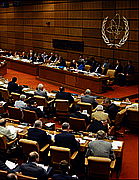A Bad Week for the Islamic Republic of Iran
» Two International Resolutions on Friday
Last Friday two key international organizations each passed a resolution against the Islamic Republic of Iran. Tehran responded angrily to both.
The UN General Assembly passed a resolution with a strong majority condemning the “plot to assassinate” the Saudi ambassador in the US, attributed to Iran, which also asked the Islamic republic to “respect its international obligations.”
On the very same day, the IAEA Governing Board issued its own resolution once again expressing its “deep and continued concern” over Iran’s nuclear activities.
But there is more bad news for Iran. Even as these two resolutions were passed, the country’s human rights record was also under discussion at the General Assembly and it is widely believed that a resolution against Iran would also be passed soon because of its human rights shortcomings.
The UN General Assembly resolution condemning the plot to assassinate the Saudi ambassador was initiated by the Saudi UN mission in New York. Even though this document does not directly condemn the Islamic republic of Iran in having a hand in the plot, Tehran is called upon to cooperate with international institutions and is asked to hand over those “individuals who have played a hand in the plot.”
American officials announced two months ago the arrest of an Iranian-American affiliated to Iran’s Revolutionary Guards Corps’ Qods Force in connection with an assassination plot in Washington, while another person, allegedly a Qods Force officer is also implicated by US officials who is said to be in Iran. The US has submitted its evidence on the plot to members of the UN Security Council and UN Secretary General while Saudi Arabia submitted a complaint to the Council against Iran.
At the UN vote, 106 countries voted positively, 9 negatively and 40 refrained in taking part in the vote call. Armenia, North Korea, Venezuela, Zambia and Cuba are among those who voted against the resolution.
Officials of the Islamic Republic of Iran have staunchly rejected the allegations from the start, calling them a “plot” against their country.
In response to the General Assembly resolution, the representative of Iran at the UN Mohammad Khazai accused the government of the United States of “creating fabricated scenarios” against Iran and called on regional countries not to “be taken by the plots and deceits of the US. “Experience has shown that countries that pursue the interests of the White House are eventually abandoned by the US,” he said as quoted by the official IRNA news agency.
In a letter submitted last Wednesday to the president of the General Assembly and the UN Secretary General, Khazai warned about the consequences of the General Assembly resolution against Iran over the accusation of plotting to assassinate the Saudi ambassador in the US and labeled it a “threat to international and regional security.”
These developments take place as the former Saudi intelligence minister Torki al Faisal, who is also the nephew of Saudi King Malek Abdullah on Tuesday said in Washington that there was plenty of heinous evidence indicating Iran’s hand in the terror plot of the Saudi ambassador.
In response, Iran’s leader ayatollah Khamenei called the accusations “dubious and senseless,” and added that this “accusation failed in its purpose and would not work.”
In the declaration issued by the IAEA, the document called on Iran to immediately implement UN Security Council resolutions regarding the country’s nuclear program and to stop its enrichment activities.
This resolution was passed with 32 affirmative, 2 negative (Ecuador and Cuba), and one abstention (Indonesia) vote. Iran’s representative at the UN agency Ali Asqar Soltanieh called the resolution “disappointing” and warned that it would have a negative impact.
In the meantime, the US, Britain and Russia welcomed the new resolution against Iran by the IAEA.
Unlike earlier resolutions, this latest document did not include a deadline, which was apparently done to win over the support of Russian and China. There is also no language for re-referring Iran back to the UN Security Council. The resolution asks the Secretary General of the agency, Yukiya Amano to prepare a report on the implementation of the latest resolution and submit it to the Board of Governors next March. This resolution comes a week after Amano submitted a report on Iran’s nuclear activities which for the first time expressly says that Iran has been involved in activities related to nuclear explosives.
Talks between Western powers and Iran over the country’s nuclear program ended last December with no results and new talks are scheduled to resume next month.
On the issue of human rights, Amnesty International said that the draft resolution of UN’s third committee on Iran’s human rights record lists the country’s violations, particularly the growing number of death sentences. To prepare for the debate in the General Assembly and influence the outcome of the session, Iran has dispatched a delegation to New York. The resolution is said to condemn Iran’s human rights record. The team in New York is led by Mohammad-Javad Larijani, the head of the human rights committee of Iran’s judiciary, who also happens to be the brother of the Speaker of the Majlis and the head of the judiciary in addition to be being a senior advisor to the country’s supreme leader ayatollah Khamenei.


